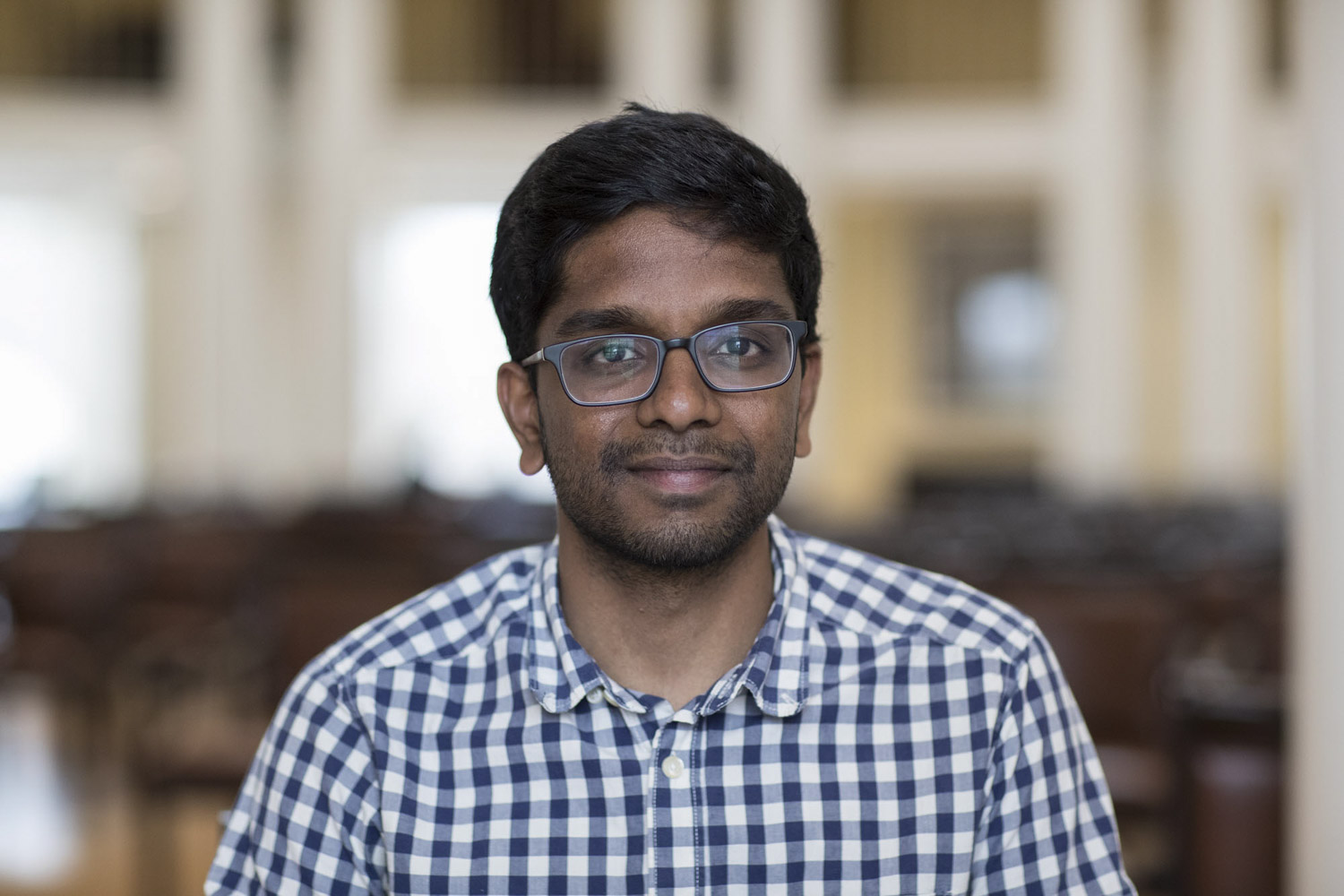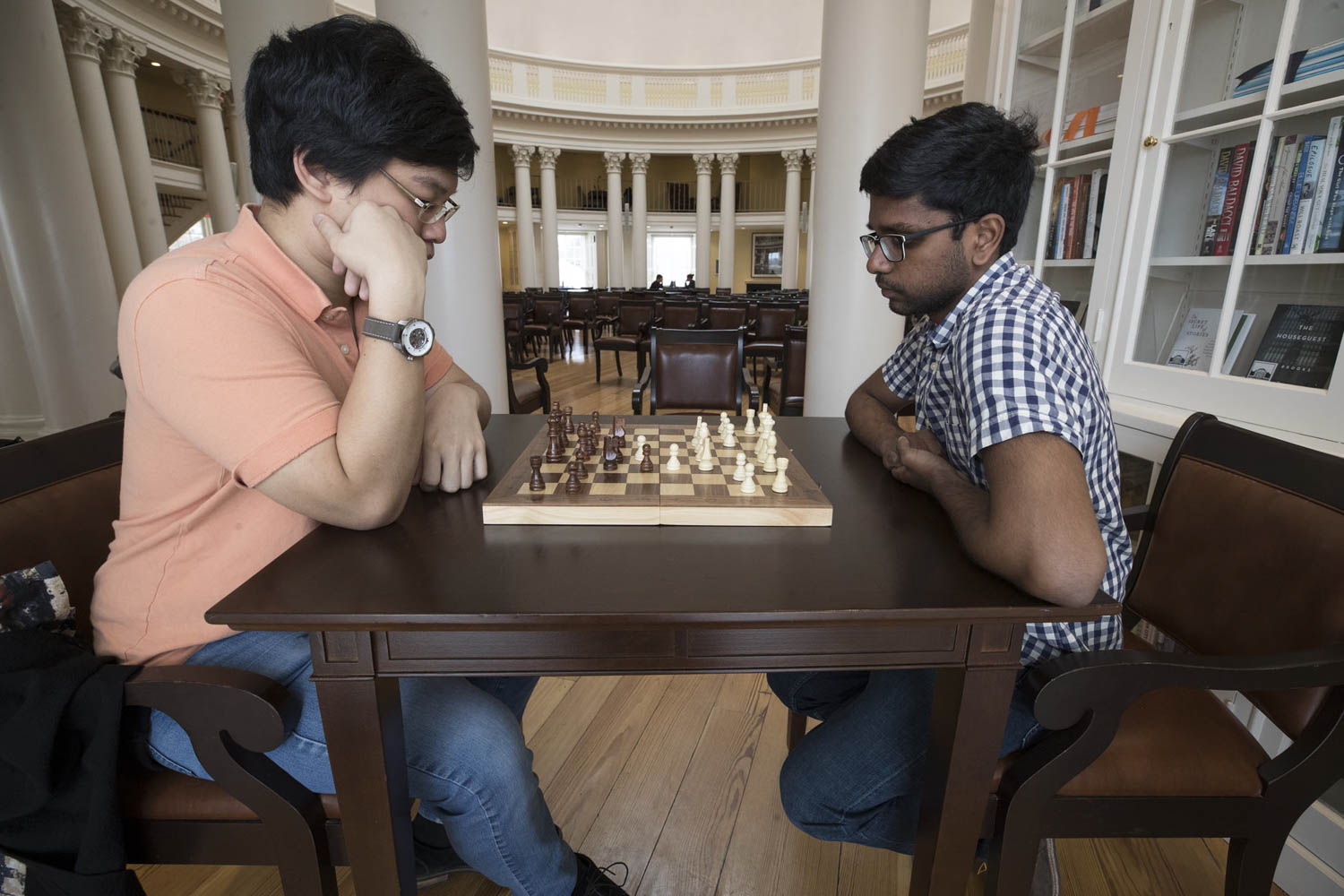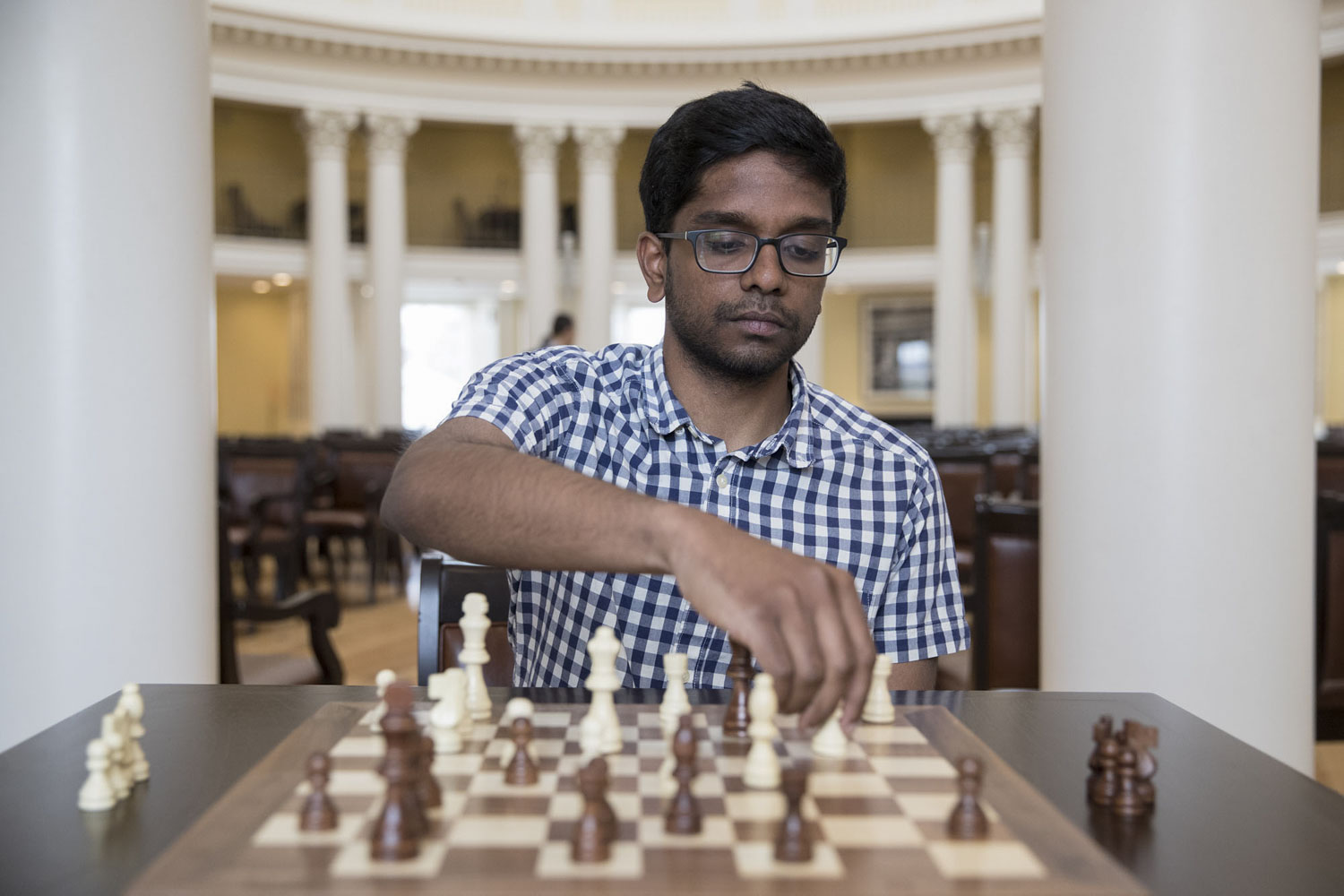Jeevan Karamsetty wants to teach you the game of chess.
Yeah, you.
Oh, you don’t know the difference between the castle-looking piece and how to castle? Karamsetty doesn’t care.
You don’t know what it means to put your opponent in a fork or skewer? Karamsetty doesn’t care.
Heck, you don’t even know for sure if you are setting the chess board up correctly? Karamsetty doesn’t care.
“Basically, if anyone, ever comes up to me and says, ‘I care about chess,’ then I make it my mission, ‘How can I help them as much as possible?’” said Karamsetty, a rising fourth-year University of Virginia student double-majoring in commerce (with concentrations in finance and management) and computer science and the president of the UVA Chess Club. “I couldn’t care less if you don’t know how to move the pieces.
“Come to club, and we’ll teach you.”

Karamsetty caught the chess bug at age 4 by watching his cousins play, and his father taught him the game.
Karamsetty is an incredibly talented player himself, having traveled the country and the world for prestigious tournaments and earned the distinction of “National Master” from the United States Chess Federation. But his greatest passion is teaching the game.
During the academic year, the UVA Chess Club meets Wednesdays from 8 to 10 p.m. in Newcomb Hall, room 177. If you have any UVA affiliation – student, staff or faculty – you are welcome to join. While the club is off for the summer, it will pick back up next semester at the end of August.
You will receive a warm greeting from Karamsetty, play some relaxed games with other club members and have the chance to listen in on a Karamsetty lecture.
“He brings people in in a way that is so friendly,” says Colin Suvak, a rising fourth-year commerce major and chess club member. “Jeevan’s inherent joy brings people in.”
***
When Karamsetty was 4 years old, he went on a family trip to India, where he was born and lived briefly before moving to Northern Virginia. On the trip, Karamsetty saw many cousins playing chess. Karamsetty did not know how to play.
“I felt very left out,” he said. “I begged my dad to teach me.”
Karamsetty initially listened in on his older sister’s chess lessons with his father, Pardha. Then he started to work more closely with his dad.
He picked up the game quickly. After playing for just a few short months, the student beat the teacher. “I couldn’t tell you what that specific scenario was like,” Karamsetty said of the milestone first victory over his father. “I’m sure my dad could.”
Soon, Karamsetty became obsessed, and his dad was ever the great teacher. Even when Pardha worked long hours during the day, he would stay up late into the night to work with his son. Some nights, even after midnight.
Karamsetty played so much online chess, he had to be coaxed away from the computer.
“My parents had to talk me out of playing sometimes,” he said. “My mom said that I used to play online so much that she would tell me I could play only if I went outside first.”
Karamsetty played in his first official tournament in January 2003, just before his fifth birthday. A couple of months later, he finished fourth in Virginia’s kindergarten-to-third grade championships. In December 2003, he tied for first at the Kindergarten National Championships.
Fast-forward a few years, and the accomplishments grew more impressive. Karamsetty finished 11th at the 2008 World Youth Chess Championships, held in Vung Tau, Vietnam. And he finished fourth at the North American Youth Chess Championships in Mazatlan, Mexico in 2009.
Karamsetty’s current World Chess Federation rating is 2230, and he is ranked among the top 250 active players in the United States. By comparison, Magnus Carlsen, the world’s No. 1 player and current world champion, is rated 2843.
Karamsetty is working toward an International Master distinction. To earn that, he has to perform well in invitation-only “norm” tournaments with high-quality fields. The only step after International Master is the coveted Grandmaster title.
“I often get asked, ‘Do you want to want to be a Grandmaster?’” he said. “Absolutely. But I know how much energy, effort and time that it takes. I would love to put that time into it, but at the same time, there are other things that I really care about.”
The 20-year-old has many interests – including working on technical projects and studying investing, interning this summer in Silicon Valley at McKinsey and Company, a global management consulting organization, and, eventually, working toward creating his business.
But there is no doubt one of his top interests is teaching chess.
And it has been a top interest for years. At home in Northern Virginia, when he was in fourth grade, he and his dad formed a club at Oak Hill Elementary School. They lured 50-plus students from grades kindergarten through sixth to attend weekly meetings regularly.
He feels right at home leading the UVA Chess Club.
***
Karamsetty invites anyone to join the chess club. Many are intimidated by the game.
“People think, ‘There’s no way I am good enough to come to chess club,’” he said. “There’s this perception that you have to be good to come to the club. You really don’t.”
At the beginning of the school year, especially, Karamsetty’s goal is to get as many people as possible to the club and get them comfortable with the game.

The UVA Chess Club meets Wednesdays from 8 to 10 p.m. in Newcomb Hall, room 177, and welcomes anyone interested in learning the game.
“After a month or so, if we did our jobs and people feel like that they have been exposed to chess and they are coming back each week, then the next part is, ‘How do I focus on training these people?’”
During the spring semester, about 15 to 20 players came regularly to meetings and lectures.
Karamsetty would love for those numbers to increase next fall when school begins again.
Chess is not just a game to Karamsetty. It’s a tool to improve life overall.
“It has helped me take creative, unique and structured approaches to tackling any problem that I am presented,” he said. “It has also been tremendously helpful in improving my concentration, time management and problem-solving abilities.
“Chess has had a profound impact on other parts of my life.”
Media Contact
Article Information
May 31, 2018
/content/student-spotlight-uvas-elite-chess-player-evangelist-game

